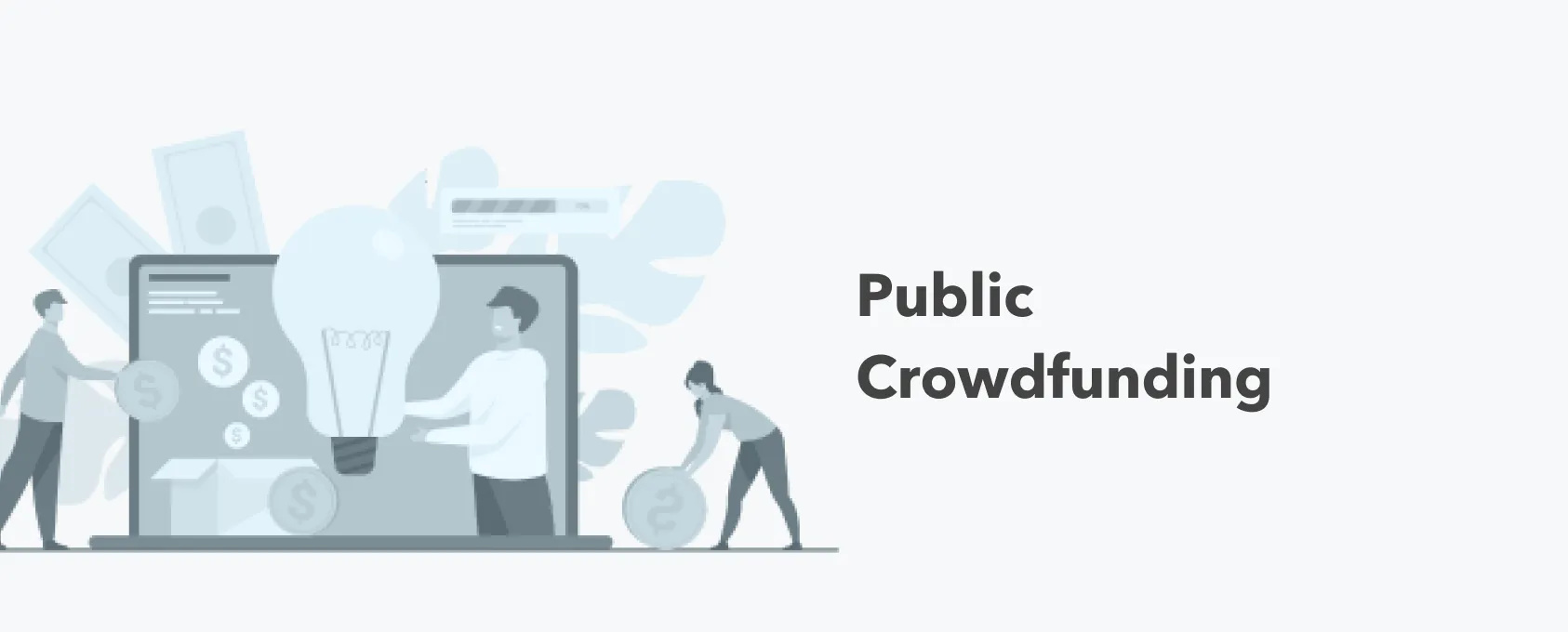Summary
Every start-up funding strategy has its advantages and disadvantages. But how do you know which way to raise funds for your company?
Your decision depends on the amount you need, how much control you’re ready to give up and how big your start-up is.
We're here to help you make an informed decision. In this article, we explore the pros and cons of six popular methods of start-up funding.
- Friends and family
- Angel investors
- Start-up incubators
- Venture capitalists
- Crowdfunding
- Bootstrapping
1. Funding from friends and family

Friends and family are usually a start-up's first exposure to funding. When needed, they provide the initial boost to start a business. The founders later 'graduate' to more formal funding methods as the business matures.
However, the importance of friends and family as a type of start-up funding shouldn’t be underestimated. Start-ups receive more than 60 billion USD a year from friends and family, more than angel investors and venture capitalists (VC) combined.
Advantages
Friends and family are easy and fast sources of funding
Your friends and family are more willing to invest in your company without looking at business results, legal compliance and other things formal investors look into.
They're also much easier to find than other methods where you need to apply, pitch and follow a legal process.
Speed is critical when building a start-up, especially in the initial stages. So using friends and family is a great way to cover early start-up expenses.
Disadvantages
High personal risk
If your business fails and you can't return your investor's money, your relationships will be at risk. Moreover, investments gone wrong can lead to legal accusations of breach of contract or other financial disputes.
Not as well connected
Most friends and family aren't as well-connected as angel investors or venture capitalists. This can hinder your access to much-needed professional expertise and investor networks to grow your start-up.
Blurring lines between personal and professional relationships
Friends and family may ask you for constant updates on your progress. They may expect to make business decisions now that they have a financial stake in your company, which can complicate your decision-making process.
Use this start-up funding method if
- You are willing to put in your own money to avoid the risk of your friends and family feeling cheated if your start-up falls through and they lose part of their investment.
- You have friends and family who understand the risks of investing in a young start-up. Manage their expectations of how much they will get involved in your business decisions.
- You have a strong business plan and a prototype to share with interested parties.
TIP: Consider putting repayment terms and drafting a formal contract for any investment with a friend or family. Define in writing how much they can expect to be involved in the business.
A proper arrangement becomes a safety net to avoid any significant issues, and a guide about the steps to follow should anything go wrong. Clear communication is crucial here to navigate a potentially tricky situation.
Avoid assuming you can be casual and personal with these types of investments.
Where to find them?
You already know them, but it's essential to treat this as a business relationship. Draft a solid business plan that explains how you're going to make your new company profitable. It should include your target milestones, financial information and business metrics.
2. Angel investors

Angel investors are affluent individuals who fund early-stage start-ups with their own money for partial ownership. Angel investors are different from venture capitalists who pool money from investors and combine the money in a managed investment fund.
Angel investors are usually business executives, other entrepreneurs or professional investors who make a living from investing. They invest relatively smaller amounts (USD25,000 to USD100,000).
Advantages
Minimal risks
Unlike loans, you don't need to pay back the original investment amount as the angel investor receives equity in exchange. Having an angel investor can help free up your time and give you peace of mind to focus on establishing your business.
You benefit from their expertise and professional network
Angel investors are usually veteran entrepreneurs. They have business expertise, industry knowledge and professional networks to support you.
Angel investors become your business partner and want to see your start-up succeed. They can connect you with potential future investors, business development opportunities or other forms of expertise.
Finding a credible angel investor can set your business up for success early and improve your survival chances.
Faster and more straightforward closing process compared to VCs
An angel investor operates independently and focuses on early-stage start-ups. Because angel investors own their money, the due diligence process is usually faster and less complicated than with VCs.
Disadvantages
You give up equity and control of your business
On average, start-up founders exchange 20% of their start-up’s equity for investment capital. Bringing an angel investor onboard also means they become your business partner. They will be invested in your business decisions and can influence your direction.
You will have targets to hit
Angel investors expect a significant return (sometimes even up to ten times their original investment over a five-year horizon). This creates pressure on you and your team to deliver results.
Use this method if
- Your company is ready to grow and expand at a rate that the angel investor expects.
- You have a product, solid business plan, team and a basic pitch deck in place.
- You're prepared to give up a portion of your business. Ask yourself what amount of equity you're willing to give up in exchange for capital.
Where to find angel investors?
- Attend start-up pitching events or ask your professional network if they can introduce you to potential angel investors. Warm introductions improve your chances of success.
- Explore curated angel investor networks like BANSEA or Angel Investment Network.
3. Start-up incubators

Start-up incubators invest small amounts at early stages. They support you as a company, and not as individuals like angel investors. Incubators are usually part of a broader, more structured programme.
These are fantastic for first-time founders. You learn from a structured programme and more experienced entrepreneurs who can connect you to investors for future fundraising efforts.
Advantages
Everything for your start-up in one place
Start-up incubators come with nearly everything an early start-up needs. Incubators offer a company workspace, mentorship and funding support. Moreover, they grant access to professional services like lawyers and accountants, helping you save costs on overheads and operations.
Reasonable investment approach
Start-up incubators invest as a company. They're more likely to offer reasonable investment terms to start-ups.
Disadvantages
The application process can be rigorous and competitive
Start-up incubator programmes are structured. They require you to submit a detailed business plan, disclosing all business activities.
Significant time commitment
Attending start-up incubators is like enrolling in a university degree. There's a fixed time commitment of up to two years, training and workshops to follow, and people to report to.
All this is fantastic if you thrive on a structured approach and need time to learn the ropes, but more experienced founders may want to give this a pass.
Use this method if
- You're a first-time founder and thrive on a structured programme with access to capital.
- You need other help beyond funding support to get your start-up idea off the ground.
Where to find start-up incubators?
- Find a suitable incubator in Aspire's list of the ten best start-up incubators in Singapore and worldwide.
- Explore Map of the Money and filter for start-up incubators.
4. Venture capital funds (VCs)

Approaching a venture capitalist or investor fund is similar to approaching angel investors. If accepted, the VC puts aside a sum of money and invests it in your start-up in exchange for partial ownership of your company.
In a venture capital fund, investment money is pooled from private investors to invest in high-growth companies. It does not come from a single individual.
VC funding is more common starting from Series A and above, as it involves millions of dollars in a single round. This isn’t for all entrepreneurs. They favour technology companies in biotech or communications and software with high-growth potential.
Advantages
Larger investment amounts
With VC funding, you can access more capital than in any other way. The average Series A funding amount is 15.7 million USD as of June 2020.

Credibility and access to an extended network of resources
An endorsement by a top-tier VC firm acts as positive social proof about your company's progress. They also come with their professional networks, business expertise and other funding support that you won't be able to access otherwise.
Disadvantages
Challenging and time-consuming to obtain
The entire fundraising process takes months. You need to prepare, pitch and close a deal while running your business. You also need to be prepared for lots of rejection during fundraising.
You need additional company structures which require access to professional services
Introducing a VC into your company requires more formal structures. You'll need to think about structuring a board of directors, board meetings and other organisational structures which take time away from actually running your business.
Dilution of equity and company control
Bringing a VC onboard means you give up some ownership of your company to the VC. They'll also be involved in your business decision-making, and you'll need to answer to them regularly.
Use this method if
- You're a technology-driven business in communications, biotechnology or software, and have a high potential for growth with a viable product.
- You're showing fantastic business traction, and you're ready to scale your business.
- You can clearly explain your product and its unique value.
- You have sufficient financial runway (8-12 months of cash flow for operating costs, including money for professional services like lawyers, tax advisors and accountants to close your funding round).
- You have the time and resilience to prepare pitch decks and meet potential investors.
Where to find venture capitalists?
- Use Crunchbase to curate investor profiles.
- Ask your current seed investors if they know any Series A investors and fund partners.
- Attend start-up events like pitch competitions and start-up demo days.
- Ask your network if they can provide a warm introduction.
- Enrol in accelerator or incubator programmes.
5. Public crowdfunding

Crowdfunding is raising money through the combined efforts of a large pool of people who contribute various amounts of money. The most popular variant of crowdfunding comes in the form of rewards, where funders receive bonuses, early access and other perks for their financial support.
Other models of crowdfunding include:
- Equity crowdfunding: This is similar to bringing an angel investor or VC on board, where people get equity in your business in exchange for an investment.
- Debt crowdfunding: This is when business owners borrow money from individuals. Loans are structured similarly to taking a traditional business loan from a bank.
Advantages
Builds social proof and traction if done well
Crowdfunding campaigns act as viral marketing campaigns, generating a group of engaged customers and word-of-mouth marketing. This can provide an early example of business traction and idea validation. Therefore, it helps generate momentum as you speak to other potential customers or investors.
More efficient than traditional fundraising
It’s easier to set up a crowdfunding campaign than to go through the pitching and meeting investors process. Crowdfunding also acts as a strong marketing and press coverage activity.
Helps refine your idea with feedback
Putting your business idea out in public exposes you to a strong feedback loop. You may get ideas and questions about your start-up and business model from your backers. Feedback allows you to test and refine your idea, validate the market and engage with potential customers all in one.
Disadvantages
Need for accountability and transparency
Crowdfunders expect regular progress updates on the status of your business, and you need to be able to deliver what you promised if the campaign succeeds.
All the positive word of mouth and marketing you've generated during your campaign can quickly turn against you if you fail to deliver.
It does not suit all business concepts
Crowdfunding works well if you're looking to start a consumer-facing product like a new tech gadget or designer shoes. It's less likely to favour technology or business-to-business (B2B) start-up companies.
Use this method if
- You can design strong perks and backer privileges that entice potential backers.
- You have a physical product prototype ready to show in your campaign.
- You're prepared and ready to spend time and effort creating, marketing and actively speaking to backers on different crowdfunding campaigns. A solid social media presence and video pitch will help you create a successful crowdfunding campaign.
Tip: Mention that you’ve invested your own money in your campaign to help establish trust in your backers.
Where to start a crowdfunding campaign?
Have a look at crowdfunding sites like Kickstarter and Indiegogo.
6. Bootstrapping a start-up

Bootstrapping is when a start-up founder finances their business with personal funds and avoids external fundraising to build a self-sustaining business. It's a slower, quieter way of developing a business. You focus on making sales and increasing revenue to cover operating costs.
Advantages
You maintain complete control over your business
Bringing external investors on board comes with the cost of loss of ownership. Investors may influence your company's direction differently than you're anticipating, or set business targets you disagree with.
Bootstrapping ensures your team receives all your company's profits and you aren't answerable to anyone on your business decisions.
You don’t have to spend time on fundraising
Fundraising in itself is a massive commitment. You need to spend time preparing pitch materials, prospecting investors, meeting them and closing the deal.
Bootstrapping keeps you focused on your business goals and allows you to devote all your attention to growing your revenue.
Disadvantages
You miss out on external business expertise and networking opportunities
External investors come with their professional networks and expertise. You also lose out on any credibility that an established investor brings to the table. Because of that, it may take you longer to grow a company without an initial investment.
Financial pressure
Bootstrapping means you're entirely reliant on your savings or bank loans to fund your start-up. Growing a company and building a workable product takes time. Be prepared not to be earning much money for a while, which can land you into personal debt, especially if your business doesn’t take off.
Not practical, especially if you need a significant upfront investment
Bootstrapping becomes more challenging if you're in a manufacturing, import or high-tech industry as these businesses require a more substantial investment to start.
Use this method if
- You’re prepared to keep expenses low and operations lean.
- Your main priority is developing a sellable product and getting paying customers. All other costs should be kept as low as possible while building your paying customer base.
Tip: Just because you've chosen to bootstrap your start-up doesn't mean you need to bootstrap forever.
One option is to rely on bootstrapping to establish your company and build a product without taking outside investment.
Later, when your company is more mature, look for external funding. This two-step approach may even benefit you as your company becomes a more attractive investment.
Choosing the correct type of start-up funding for your business
Each of these six types of start-up funding has its unique strengths and weaknesses.
To decide which one is best for you, think about your company’s current position and what you’re comfortable with.
Do you thrive in a structured environment and need more support beyond funding? Look at a start-up incubator.
Prefer to do things your way? Think about bootstrapping your start-up.
If you're looking at becoming the next high-growth start-up success story, explore angel investing and venture capital funding to realise your vision.

.webp)








%201.webp)


.webp)